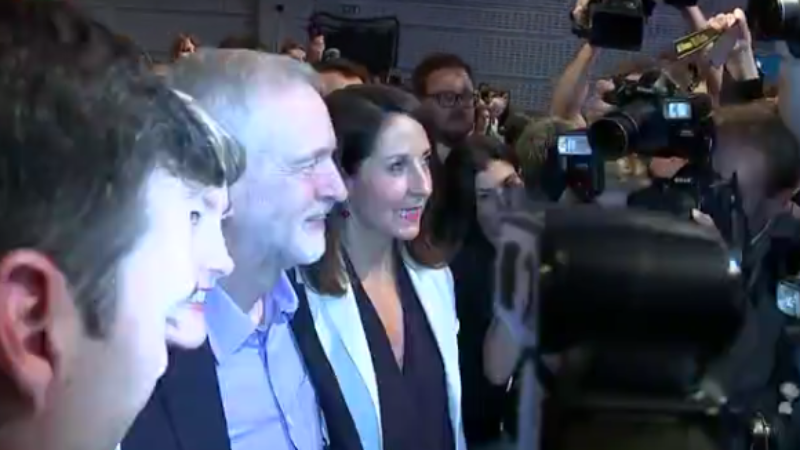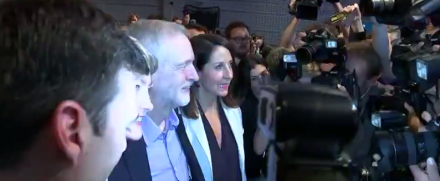

I thought I would try this week to give an honest assessment of the strengths and weaknesses of my own wing of the party and the challenges it will face in order to come back from the epic defeat it suffered at Jeremy Corbyn’s hands last summer.
Before people start chuntering, “coming back” doesn’t mean toppling Jeremy.
It means being in a position to be more competitive in the next leadership election to be his successor whether that comes in two months or two years or after the 2020 General Election, or in 2025 when a 75-year-old Jeremy Corbyn decides to retire after his second landslide General Election win, having overseen five years of radical social and economic progress.
There’s nothing disloyal about trying to maintain balance and the strongest possible moderate voice in the party and secure the best personnel and policies we can from our perspective while the left are in the driving seat, nor planning for a future recovery. It’s exactly what Jeremy and John McDonnell did throughout their time on the backbenches, building up an organisation in the country and a platform of ideas and policies, and contesting internal elections and selections.
The plus points for Labour’s moderates seem to me to be as follows:
1. We are doing surprisingly well in other internal elections and selections. This was already the pattern down-ticket in the leadership election where, on the same ballot as Jeremy’s big win, the deputy leadership, the London Mayoral selection and the Conference Arrangements Committee all went to people not associated with Jeremy’s politics, and the National Policy Forum elections were more or less a draw. Since then selections for parliamentary by-elections have produced pleasing results, elections for annual conference delegates look likely to produce a conference floor with similar or more moderate politics to previous years and, in the nomination stage for the six CLP representatives on the NEC, the leftwing Campaign for Labour Party Democracy has warned its supporters that “For what is probably the first time the right wing slate for the NEC put together by Progress and Labour First is getting far more CLP nominations than the Centre-left Grassroots Alliance (CLGA) slate (excepting Ann Black).” This was before the potentially dramatic impact on the election of Ken Livingstone’s suspension and subsequent replacement on the left’s NEC slate. Momentum Sheffield echoed this warning this week, telling supporters that “right-wing NEC candidates standing on the Labour First slate have many more nominations than left-wing candidates.” Of course, if the turnout and voting pattern from last summer are repeated, the left will take all six seats, but that’s a big if, and the CLP nominations are a valuable indicator in themselves as they show the opinions of the most active members who turn up to meetings and are the engine room of the party’s election fighting machine. The reasons for these perhaps counter-intuitive indicators are probably:
o Moderates are more organised than they have been for at least a decade as the challenge from the left has galvanised us into loads of activity. For instance, no one used to bother contesting conference delegate elections – it was seen as a week’s networking and socialising that was given to the person who could be bothered to go, regardless of politics.
o There is a backlash from more established members against the somewhat crass overtly factional approach of Momentum. Being told it is year zero, and you are a “Red Tory” if you spent all your life campaigning for Labour, has put peoples’ noses out of joint so they kick against it.
o Momentum’s strength is patchy. The new membership surge has been disproportionately in inner city areas, university towns and areas with large numbers of current or retired public sector workers. This does not matter in One Member One Vote national ballots, but where CLPs are voting individually it does, as the new left have swamped certain CLPs but hardly impacted many working class constituencies. In inner London, Liverpool and Manchester, Momentum have been particularly active but have been met, and in most CLPs beaten, by an equally strong response.
o Support for the moderate slate has broadened because of the identification of most of the left slate (with one clear exception) with Momentum, which has damaged the previous “Centre Left Grassroots Alliance” branding, and alienated the soft left and centre of the party.
2. We remain far stronger than the left in terms of personnel. The majority of the Shadow Cabinet and the front bench come from traditions other than the Hard Left. An entire potential moderate Shadow Cabinet is now sat on the back benches. The bulk of the PLP are moderates. So are all except a couple of Labour council leaders. So are most councillors. So are most people who want to be MPs and have the skill set and gumption to ever get selected. Without people in depth you can’t advance a political project, and between Corbyn and McDonnell and the neophytes of Momentum, the left’s talent cupboard is extremely bare.
3. If unity is strength, the leadership election result united Labour’s moderates and ended decades of petty infighting. The tyranny of small differences between Blairites and Brownites and soft left has now been abolished, not least because according to Momentum we are all the same – “Bitterites” – anyway.
4. The definition of moderate is now extremely broad because whilst Corbyn’s OMOV support included many members from the soft left and centre of the party, his team’s dealings with the PLP and Momentum activists’ scattergun approach to threats of de-selection has meant the left-right dividing line in the party now sits just to the right of the Campaign Group of MPs. First-term MPs who the whips expected to be rebel left-wing backbenchers have turned out to be vocal critics of a left leadership. The tectonic plates are shifting in the major unions in reaction to interference by the left in internal elections and industrial clashes on issues like, but not limited to, Trident where Corbyn’s policies are not in the employment interests of union members.
And what do we need to fix? Four huge challenges stand out:
- We need a stand-out candidate to be prepared (in the sense of both ready and willing) to run for leader. That doesn’t mean against Jeremy. It means after he goes. We lost the leadership race partly because we didn’t have sufficiently charismatic and politically-clear sighted, hungry to win candidates. We need someone who will look like a dead cert General Election winner. As in the 1980s where Blair and Brown both emerged and were slowly but surely built up as people who looked like they could be PM, we need to identify, protect and promote potential leaders. And for each of them to accept they may need to settle for another top rank job and stand aside so there is only one clear runner.
- We need an ideological refresh. We can’t beat the ideology of 1983 or 1917 with the ideology of 1994. The left know what their ideas are and are busy falsely labelling ours as “neo-liberal” when the reality is more that we were so busy with the nitty gritty governing and then trying to get back into government that we hadn’t thought for two decades about what the big idea of our democratic socialism was. Someone needs to write a book that sets out what it means to be a revisionist democratic socialist in the 21st century and what our vision of a future, more equal British society and state looks like. Who is going to be the Tony Crosland of now, and write the new Future of Socialism?
- We need a policy refresh. I can’t remember any new ideas from our wing of the party that actually got traction since the choice agenda in public services (which I disagreed with) and the respect agenda on anti-social behaviour (which I agreed with), both a decade ago. With many of our brightest MPs on the backbenches, they should be using the time constructively to generate new policies that will appeal to both the members who decide internal elections and the voters who decide public elections. If Jeremy and his team are open minded they will be welcome to poach them; if not we will have a clear alternative policy agenda on the shelf.
- We need to develop the messaging and machinery to play Momentum at its own game in mass recruitment of members and registered supporters. Only Jeremy’s campaign understood the new leadership election system in 2015 and reached out and changed the internal party electorate rather than just trying to win over existing members. But if they can do this and recruit 200,000 people from the far edge of the political spectrum based on a candidate and ideas that were and are of limited popularity with the wider population, why couldn’t a charismatic moderate candidate enthuse many times that number of people from the many times larger pool of voters who comprise the rest of the centre-left public to the right of the Hard Left? In France a primary system in the Socialist Presidential selection saw 2.8 million people register in a similar way to in Labour’s poll and vote, seven times more than the 422,000 who voted in our leadership election. Before anyone says you can’t enthuse moderates to mobilise in the UK in the same way you can people with more radical ideas, they need to explain how Tony Blair managed to get 507,950 votes for leader (more than Corbyn as hundreds of thousands more trade unionists participated then and they voted overwhelmingly for Blair), and how the three years after Blair’s election as leader saw party membership (full members, not supporters) rise from 266,270 to 405,238. This recruitment exercise took place in an era where there was no internet to recruit via and to join the party you had to fill in a coupon from a newspaper or a leaflet and post it back with a cheque.
The above four obstacles are huge but they are not insurmountable. But they require people to have huge ambition and political self-confidence about what is achievable.
I refuse to believe that if the people around Jeremy Corbyn can achieve what they have done that the people from my wing of the party can’t, in future, do the same.
As the (moderate, and guillotined for it) French revolutionary Danton said: “il nous faut de l’audace, et encore de l’audace, et toujours de l’audace” – “We need audacity, and yet more audacity, and always audacity!”.




More from LabourList
MPs, union leaders and organisations react to ‘bruising’ Gorton and Denton result
A gory night for Labour
‘SEND reforms are a crucial test of the opportunity mission’